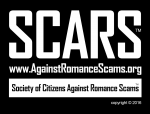RSN™ Scam Warning: Charity Scams
FROM ACCC’s Scamwatch
Scammers are increasingly using fake charities or impersonating real charities to take advantage of people’s generosity and compassion, with losses reported to the ACCC’s Scamwatch increasing steadily over the past four years.
This week is Charity Fraud Awareness Week and Scamwatch is warning people to watch out for fake charities and offering some quick and easy precautions to take to ensure their money goes towards a legitimate charity organization.
So far in 2018, Scamwatch has received 689 reports of fake charities scams with more than $320,000 in reported losses. This compares to the whole of 2017 where reported losses were $313,563.
“Australians are very generous, donating billions each year to thousands of different charities. Unfortunately, scammers are increasingly using people’s generosity against them by setting up fake charities to fleece them,” ACCC Deputy Chair Delia Rickard said.
“This is a particularly appalling scam as beyond just stealing money from unsuspecting victims, the scammers also take money meant for legitimate charities. Donations are the lifeblood that supports charities and their ability to help people in need.”
Fake Charities Operate In A Number Of Different Ways
Scammers may approach people on the street (for example, posing as a monk, or a collector for a specific cause) or at their front door. Scammers may also set up fake websites which look similar to those operated by real charities. Some will call or email people requesting donations.
“Fake charity approaches occur all year round and often take the form of a response to real disasters or emergencies, such as floods, cyclones, earthquakes, and bushfires. The ACCC has seen horrific examples of charity scammers taking advantage of high profile tragedies like the Black Saturday bushfires and following last year’s Bourke Street tragedy. We’ve also seen some recent examples of charity scammers using the current drought to rip off people” Ms. Rickard said.
“The scammers have no shame. If they’re not creating fake charities, they will impersonate real ones like the Red Cross, RSPCA, or Rural Fire Service.”
“It’s important people are aware of these scams and take precautions to ensure their money is going to a genuine charity,” Ms. Rickard said.
People can ensure their donation is going to a legitimate charity by phoning them directly or making a donation via their website. They can check the charity is legitimate by first looking up their credentials on the publicly available Australian Charities and Not-for-Profits Commission (ACNC) website.
“Legitimate charities do employ door knockers and street collectors. But rather than just hand your money over, ask to see their identification and don’t be shy about asking questions about the charity such as how the proceeds will be used. If you have any doubts about who they are, do not pay, go the charity’s legitimate website and pay through there.” Ms. Rickard said.
“Also, avoid any arrangement with a stranger that asks for up-front payment via money order, wire transfer, international funds transfer, pre-loaded card or electronic currency, like Bitcoin. Legitimate charities don’t solicit donations in this way,” Ms. Rickard said.
Further information is available online about Charity Fraud Awareness Week »

RSN™ Team
a division of SCARS™
Miami Florida U.S.A.
END
– – –
Tell us about your experiences with Romance Scammers in our Scams Discussion Forum on Facebook »
– – –
FAQ: How Do You Properly Report Scammers?
It is essential that law enforcement knows about scams & scammers, even though there is nothing (in most cases) that they can do.
Always report scams involving money lost or where you received money to:
- Local Police – ask them to take an “informational” police report – say you need it for your insurance
- Your National Police or FBI (www.IC3.gov)
- The Scars Worldwide Reporting Network HERE or on www.Anyscam.com
This helps your government understand the problem, and allows law enforcement to add scammers on watch lists worldwide.
– – –
Visit our NEW Main SCARS™ News & Information Facebook page for much more information about scams and online crime: www.facebook.com/SCARS.News.And.Information
To learn more about SCARS visit www.AgainstScams.org
Please be sure to report all scammers HERE or on www.Anyscam.com
All original content is Copyright © 1991 – 2018 SCARS All Rights Reserved Worldwide & Webwide – RSN/Romance Scams Now & SCARS/Society of Citizens Against Romance Scams are all trademarks of Society of Citizens Against Romance Scams Inc.


![CFAW-2018-Web-Banners-Orange-Plain-975-x-385[1]](https://romancescamsnow.com/wp-content/uploads/2018/10/CFAW-2018-Web-Banners-Orange-Plain-975-x-3851.jpg)


Please Leave A Comment - Tell Us What You Think About This!